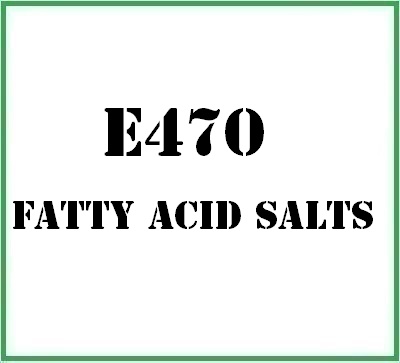The E470 family of food additives consists of various salts of fatty acids, primarily used as emulsifiers and stabilizers in food products. These salts help improve the texture, consistency, and stability of food by enabling the mixing of oil and water-based ingredients and preventing separation. The E470 family includes:
- E470a (i): Sodium salts of fatty acids
- E470a (ii): Potassium salts of fatty acids
- E470a (iii): Calcium salts of fatty acids
- E470b: Magnesium salts of fatty acids
These salts are derived from natural sources, such as plant oils or animal fats, and are commonly found in a wide range of food products, pharmaceuticals, and personal care items.
Chemical Composition and Structure
Fatty acid salts are formed by the reaction of fatty acids with various bases (sodium, potassium, calcium, or magnesium hydroxide) to produce their respective salts. The general chemical structure includes a long hydrocarbon chain attached to a carboxylate group, which then binds to a metal ion (Na+, K+, Ca2+, or Mg2+). This amphiphilic structure allows the salts to act as effective emulsifiers, with one part attracting water (hydrophilic) and the other attracting oil (lipophilic).
Physical Properties
Fatty acid salts are generally white or off-white powders or granules that are insoluble in water but can form emulsions. Their amphiphilic nature allows them to interact with both oil and water, stabilizing emulsions and preventing separation in food and other formulations. These salts are stable at a wide range of pH levels and temperatures, making them ideal for use in food processing.
Production Process
Fatty acid salts are produced by neutralizing fatty acids with the appropriate base, such as sodium, potassium, calcium, or magnesium hydroxide. These fatty acids can be derived from natural sources such as animal fats, vegetable oils (like palm or coconut oil), or other triglyceride-rich materials. After neutralization, the resulting salts are purified and processed into usable forms for various industrial applications.
Applications
Food Industry: Fatty acid salts are widely used as emulsifiers and stabilizers in a variety of processed foods, such as dairy products, confectionery, baked goods, and powdered mixes. They prevent ingredients from separating and help maintain a uniform texture.
Pharmaceuticals: In the pharmaceutical industry, fatty acid salts function as lubricants and stabilizers in tablet and capsule formulations, ensuring proper release of active ingredients and enhancing the stability of products.
Cosmetics and Personal Care: These salts are used in soaps, creams, and lotions as emulsifiers and stabilizers, helping to blend water and oil-based ingredients for a smooth and consistent texture.
Functions by Additive
E470a (i): Sodium salts of fatty acids: Primarily used in food products as an emulsifier and stabilizer to prevent oil separation.
E470a (ii): Potassium salts of fatty acids: Commonly found in similar applications, aiding in the emulsification and stabilization of water-oil mixtures.
E470a (iii): Calcium salts of fatty acids: Used in various foods and supplements, providing additional stability and texture enhancement.
E470b: Magnesium salts of fatty acids: Acts as both a stabilizer and an anti-caking agent, commonly used in powdered foods and supplements.
Health and Safety Considerations
Food Safety
Fatty acid salts (E470) are generally regarded as safe for consumption and are commonly found in everyday foods. They are approved by regulatory bodies such as the European Food Safety Authority (EFSA) and the Food and Drug Administration (FDA) for use in food processing.
Allergic Reactions
These salts are derived from natural fatty acids commonly found in plant oils and animal fats, so they are unlikely to cause allergic reactions. However, individuals with specific dietary restrictions or allergies (e.g., to animal products) should check the source of the fatty acids.
Toxicity and Carcinogenicity
There is no evidence suggesting that fatty acid salts are toxic or carcinogenic. They are metabolized in the body like other fatty acids and contribute to normal dietary fat intake.
Environmental and Safety Considerations
Fatty acid salts are biodegradable and generally pose no significant environmental threat. Their production from plant or animal sources can be sustainable, especially when derived from renewable plant oils like coconut or palm oil, provided that responsible sourcing practices are followed.
Regulatory Status
Fatty acid salts (E470) are approved for use in food, cosmetics, and pharmaceuticals in many regions, including the European Union and the United States. They are considered safe for use in food products and personal care items when used within the recommended limits.
Applications Under Strict Control
Processed Foods: Fatty acid salts are used in a wide range of processed foods, including dairy products, baked goods, and confectionery, to improve texture, emulsification, and stability.
Pharmaceuticals: They act as stabilizers and lubricants in tablets and capsules, improving product performance.
Cosmetics: Used in creams and lotions as emulsifiers to maintain the consistency of the formulation.
![]() Fatty acid salts
Fatty acid salts 

